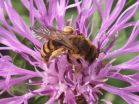(Press-News.org) ATLANTA – December 10, 2012—A new American Cancer Society study finds a strong inverse association between caffeinated coffee intake and oral/pharyngeal cancer mortality. The authors say people who drank more than four cups of caffeinated coffee per day were at about half the risk of death of these often fatal cancers compared to those who only occasionally or who never drank coffee. The study is published online in the American Journal of Epidemiology. The authors say more research is needed to elucidate the biologic mechanisms that could be at work.
Previous epidemiologic studies have suggested that coffee intake is associated with reduced risk of oral/pharyngeal cancer. To explore the finding further, researchers examined associations of caffeinated coffee, decaffeinated coffee, and tea intake with fatal oral/pharyngeal cancer in the Cancer Prevention Study II, a prospective U.S. cohort study begun in 1982 by the American Cancer Society.
Among 968,432 men and women who were cancer-free at enrollment, 868 deaths due to oral/pharyngeal cancer occurred during 26 years of follow-up. The researchers found consuming more than four cups of caffeinated coffee per day was associated with a 49 percent lower risk of oral/pharyngeal cancer death relative to no/occasional coffee intake (RR 0.51, 95% confidence interval [CI] 0.40-0.64). A dose-related decline in relative risk was observed with each single cup per day consumed. The association was independent of sex, smoking status, or alcohol use. There was a suggestion of a similar link among those who drank more than two cups per day of decaffeinated coffee, although that finding was only marginally significant. No association was found for tea drinking.
The findings are novel in that they are based specifically upon fatal cases of oral/pharyngeal cancer occurring over a 26-year period in a population of prospectively-followed individuals who were cancer-free at enrollment in Cancer Prevention Study II.
"Coffee is one of the most widely consumed beverages in the world, and contains a variety of antioxidants, polyphenols, and other biologically active compounds that may help to protect against development or progression of cancers," said lead author Janet Hildebrand, MPH. "Although it is less common in the United States, oral/pharyngeal cancer is among the ten most common cancers in the world. Our finding strengthens the evidence of a possible protective effect of caffeinated coffee in the etiology and/or progression of cancers of the mouth and pharynx. It may be of considerable interest to investigate whether coffee consumption can lead to a better prognosis after oral/pharyngeal cancer diagnosis."
###
Article: Coffee, Tea, and Fatal Oral/Pharyngeal Cancer in a Large Prospective U.S. Cohort, Am. J. Epidemiol. (2012) doi: 10.1093/aje/kws222 First published online: December 9, 2012
Caffeinated coffee may reduce the risk of oral cancers
Studies link consumption of more than 4 cups per day to significantly lower risk of death from some cancers
2012-12-10
ELSE PRESS RELEASES FROM THIS DATE:
Overweight pregnant women not getting proper weight-gain advice
2012-12-10
HERSHEY, Pa. -- Overweight women are not receiving proper advice on healthy weight gains or appropriate exercise levels during their pregnancies, according to Penn State College of Medicine researchers.
"Excessive weight gain during pregnancy is associated with weight retention after delivery and is a positive predictor of obesity after pregnancy," Dr. Cynthia Chuang, associate professor of medicine and public health sciences said. "Excessive gestational weight is particularly concerning for overweight and obese women given their already increased risk for pregnancy ...
Mining ancient ores for clues to early life
2012-12-10
An analysis of sulfide ore deposits from one of the world's richest base-metal mines confirms that oxygen levels were extremely low on Earth 2.7 billion years ago, but also shows that microbes were actively feeding on sulfate in the ocean and influencing seawater chemistry during that geological time period.
The research, reported by a team of Canadian and U.S. scientists in Nature Geoscience, provides new insight into how ancient metal-ore deposits can be used to better understand the chemistry of the ancient oceans – and the early evolution of life.
Sulfate is the ...
Prostate cancer now detectable by imaging-guided biopsy
2012-12-10
Ground-breaking research by a UCLA team of physicians and engineers demonstrates that prostate cancer can be diagnosed using image-guided targeted biopsy.
Traditionally found only by blind biopsy, a procedure that dates from the 1980s, prostate cancer now appears detectable by direct sampling of tumor spots found using Magnetic Resonance Imaging (MRI) in combination with real-time ultrasound, according to the UCLA study released Dec. 10, 2012 early online for the January 2013 issue of The Journal of Urology®.
The study indicates that the MRI and ultrasound fusion biopsy, ...
Targeted prostate biopsy has potential to improve diagnosis of prostate cancer
2012-12-10
New York, NY, December 10, 2012 – Diagnosis of prostate cancer remains imperfect. Current methods of prostate biopsy are limited by over detection of slow-growing tumors and under detection of clinically relevant cancers. Investigators at the University of California-Los Angeles Department of Urology have found that a new technique of targeted biopsy in a clinic setting, using local anesthesia, may improve diagnosis and aid in selecting which patients are suitable for active surveillance and which need focal therapy (noninvasive techniques for destroying small tumors within ...
Renewables and storage could power grid 99.9 percent of the time
2012-12-10
Renewable energy could fully power a large electric grid 99.9 percent of the time by 2030 at costs comparable to today's electricity expenses, according to new research by the University of Delaware and Delaware Technical Community College.
A well-designed combination of wind power, solar power and storage in batteries and fuel cells would nearly always exceed electricity demands while keeping costs low, the scientists found.
"These results break the conventional wisdom that renewable energy is too unreliable and expensive," said co-author Willett Kempton, professor ...
Secrets of gentle touch revealed
2012-12-10
Stroke the soft body of a newborn fruit fly larva ever-so-gently with a freshly plucked eyelash, and it will respond to the tickle by altering its movement—an observation that has helped scientists at the University of California, San Francisco (UCSF) uncover the molecular basis of gentle touch, one of the most fundamental but least well understood of our senses.
Our ability to sense gentle touch is known to develop early and to remain ever-present in our lives, from the first loving caresses our mothers lavish on us as newborns to the fading tingle we feel as our lives ...
Temple scientists target DNA repair to eradicate leukemia stem cells
2012-12-10
(Philadelphia, PA) – Despite treatment with imatinib, a successful drug that targets chronic myeloid leukemia (CML), a deadly type of cancer, some patients may continue to be at risk for relapse because a tiny pool of stem cells is resistant to treatment and may even accumulate additional genetic aberrations, eventually leading to disease progression and relapse. These leukemia stem cells are full of genetic errors, loaded with potentially lethal breaks in DNA, and are in a state of constant self-repair.
Now, scientists at Temple University School of Medicine may have ...
Bugs without borders
2012-12-10
Researchers show that the global epidemic of Clostridium difficile 027/NAP1/BI in the early to mid-2000s was caused by the spread of two different but highly related strains of the bacterium rather than one as was previously thought. The spread and persistence of both epidemics were driven by the acquisition of resistance to a frontline antibiotic.
Unlike many other healthcare-associated bacteria, C. difficile produces highly resistant and infectious spores. These spores can promote the transmission of C. difficile and potentially facilitates its spread over greater geographical ...
What it is to be a queen bee?
2012-12-10
Queen sweat bees 'choose' the role of their daughters, according to a new study published in BioMed Central's open access journal Frontiers in Zoology. The amount of food provided for the developing larvae determines whether the daughter becomes a worker or a new queen.
The sweat bee Halictus scabiosae are a primitive eusocial insect. Eusocial insects have a hierarchical society with a division of labor between reproductive queens and males, and workers. However for H. scabiosae all the adults have retained the ability to reproduce, although their role in the nest may ...
Brain study shows why some people are more in tune with what they want
2012-12-10
Wellcome Trust researchers have discovered how the brain assesses confidence in its decisions. The findings explain why some people have better insight into their choices than others.
Throughout life, we're constantly evaluating our options and making decisions based on the information we have available. How confident we are in those decisions has clear consequences. For example, investment bankers have to be confident that they're making the right choice when deciding where to put their clients' money.
Researchers at the Wellcome Trust Centre for Neuroimaging at UCL ...
LAST 30 PRESS RELEASES:
High‑performance all‑solid‑state magnesium-air rechargeable battery enabled by metal-free nanoporous graphene
Improving data science education using interest‑matched examples and hands‑on data exercises
Sparkling water helps keep minds sharp during long esports sessions
Drone LiDAR surveys of abandoned roads reveal long-term debris supply driving debris-flow hazards
UGA Bioinformatics doctoral student selected for AIBS and SURA public policy fellowship
Gut microbiome connected with heart disease precursor
Nitrous oxide, a product of fertilizer use, may harm some soil bacteria
FAU lands $4.5M US Air Force T-1A Jayhawk flight simulator
SimTac: A physics-based simulator for vision-based tactile sensing with biomorphic structures
Preparing students to deal with ‘reality shock’ in the workplace
Researchers develop beating, 3D-printed heart model for surgical practice
Black soldier fly larvae show promise for safe organic waste removal
People with COPD commonly misuse medications
How periodontitis-linked bacteria accelerate osteoporosis-like bone loss through the gut
Understanding how cells take up and use isolated ‘powerhouses’ to restore energy function
Ten-point plan to deliver climate education unveiled by experts
Team led by UC San Diego researchers selected for prestigious global cancer prize
Study: Reported crop yield gains from breeding may be overstated
Stem cells from human baby teeth show promise for treating cerebral palsy
Chimps’ love for crystals could help us understand our own ancestors’ fascination with these stones
Vaginal estrogen therapy not linked to cancer recurrence in survivors of endometrial cancer
How estrogen helps protect women from high blood pressure
Breaking the efficiency barrier: Researchers propose multi-stage solar system to harness the full spectrum
A new name, a new beginning: Building a green energy future together
From algorithms to atoms: How artificial intelligence is accelerating the discovery of next-generation energy materials
Loneliness linked to fear of embarrassment: teen research
New MOH–NUS Fellowship launched to strengthen everyday ethics in Singapore’s healthcare sector
Sungkyunkwan University researchers develop next-generation transparent electrode without rare metal indium
What's going on inside quantum computers?: New method simplifies process tomography
This ancient plant-eater had a twisted jaw and sideways-facing teeth
[Press-News.org] Caffeinated coffee may reduce the risk of oral cancersStudies link consumption of more than 4 cups per day to significantly lower risk of death from some cancers



